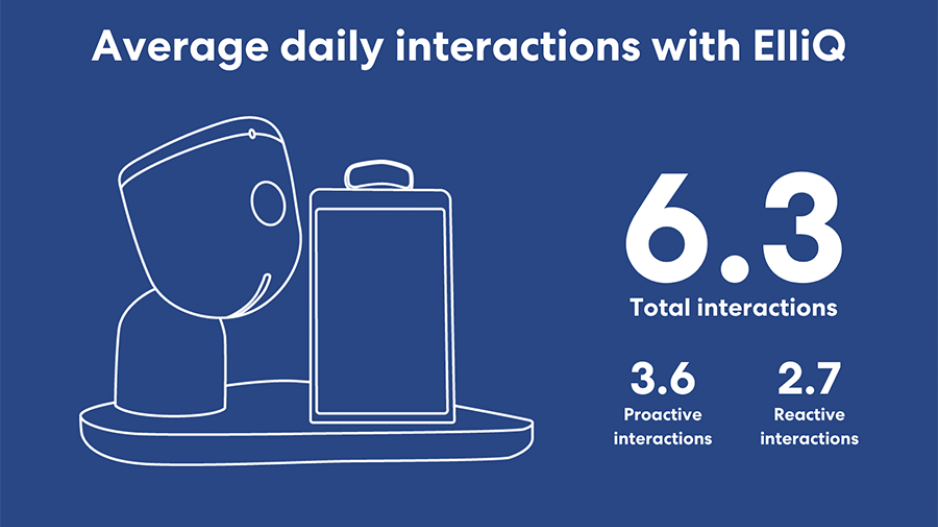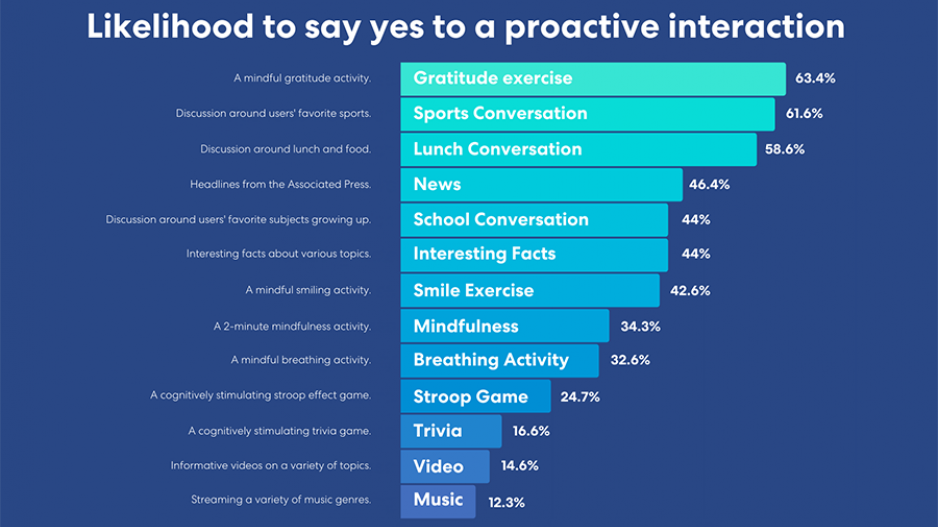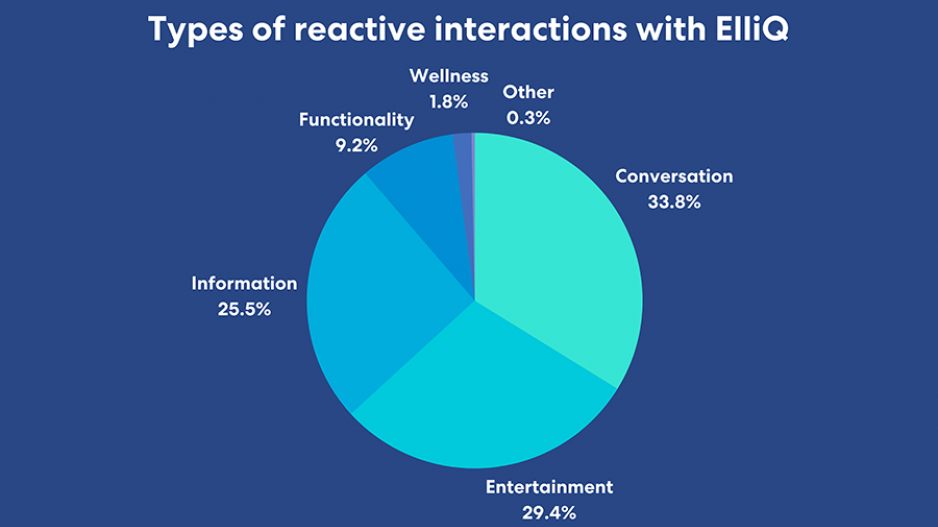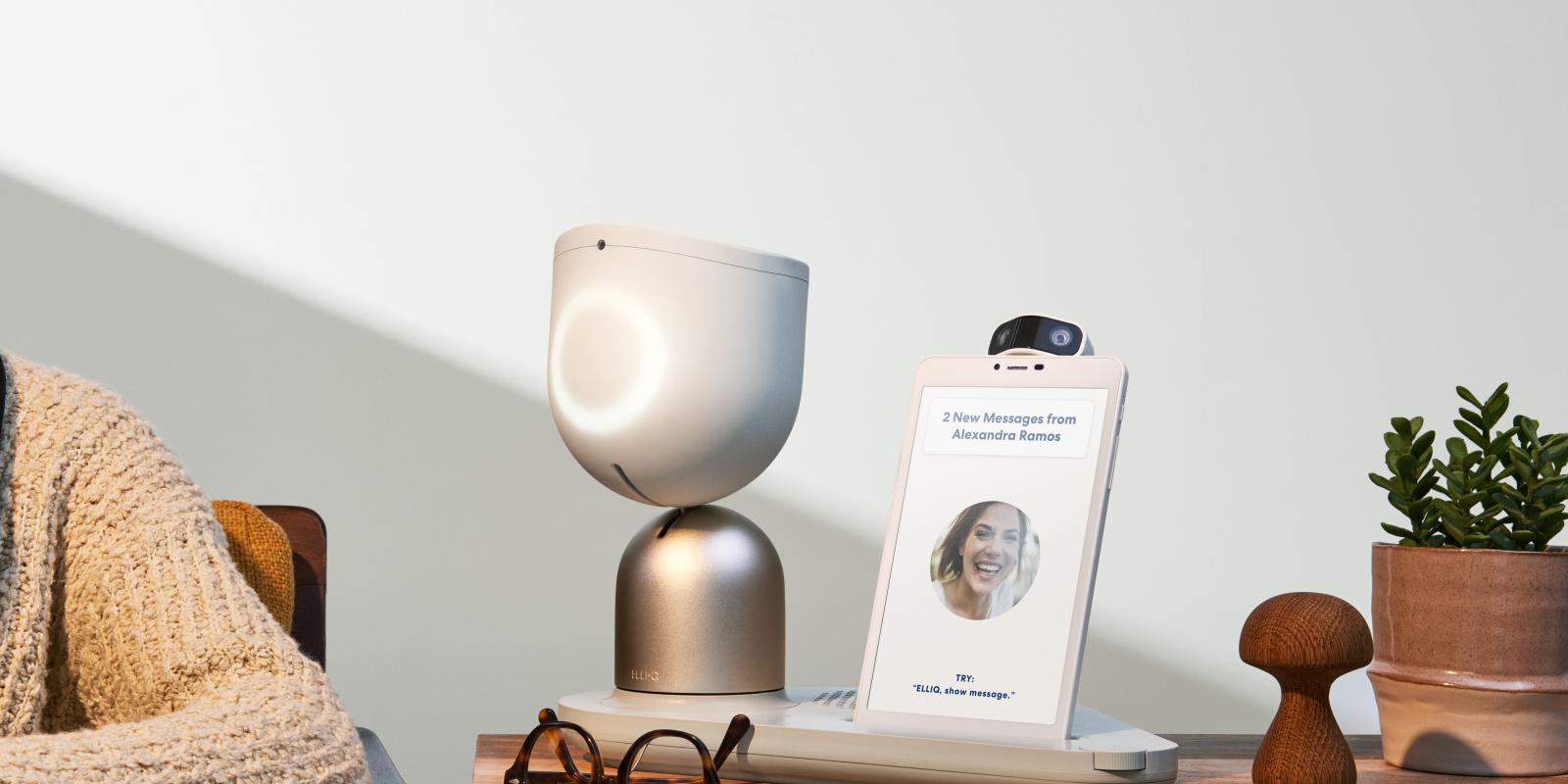Abstract:
Loneliness is an underestimated issue among older adults, especially for those who age in place. Some can fall into a routine of staying home and cutting themselves off from the outside world. Intuition Robotics found during beta testing of their social robot ElliQ that users interacted and confided in it more as they would with a living entity than a device. The more ElliQ greeted users and initiated conversations, the more they began to interact with ElliQ unprompted, forming a comradery. Having a social robot in their homes regularly proved to help alleviate their loneliness.
Key Words:
Loneliness, social isolation, Intuition Robotics, ElliQ, engagement
Though electing to age in place has a variety of benefits, from increased independence and comfort to reduced cost and risks of infection, it also has its drawbacks. Unfortunately, for those living on their own, without a strong network nearby, their lifestyle can often become socially isolated, causing them to feel lonely on a regular basis. With the increase in incidence of aging in place, it should come as no surprise that loneliness and social isolation have become often ignored but widespread conditions that many older adults had been dealing with long before the COVID-19 pandemic hit.
In a 2018 survey conducted by AARP, 35 percent of U.S. adult participants ages 45 and older were lonely, based on the UCLA loneliness scale (Anderson and Thayer, 2018). That said, due to the stigma around loneliness, the actual number is likely much higher. And being lonely and socially isolated can have some serious health ramifications—studies have linked both conditions to myriad health repercussions, such as high blood pressure, heart disease, cognitive decline, and more (National Institute on Aging, 2019).
One study found that social isolation and loneliness can cause premature mortality, similar to other well-established risk factors for mortality, such as obesity, substance abuse, and lack of physical activity (Holt-Lunstad et al., 2015). Only recently have experts begun to publicly discuss and address social isolation, and as many older adults are unwilling to admit to experiencing such adverse impacts, crafting a solution to help people cope becomes more arduous.
So how to tackle loneliness and social isolation as people age in place? While more frequent in-person interaction would seem like an obvious solution, logistically, it is not necessarily feasible—especially in situations such as the pandemic, in which older adults must avoid close contact with others.
One option for resolving these issues is to leverage the right technology, such as digital companions. Digital companions provide the opportunity to help older adults who are aging in place to feel acknowledged and connected, so time spent alone at home feels less lonely, and potentially more exhilarating. This is what Intuition Robotics (IR) is trying to accomplish with ElliQ.
Beta Testing
ElliQ was designed for older adults, to assist them with the unique challenges of aging in place—primarily loneliness and social isolation. ElliQ’s main purpose is to provide a sense of companionship, a friendly presence to chat with throughout the day, to fill the void when other people aren’t around. ElliQ also can encourage a healthier, more independent lifestyle.
ElliQ is a digital companion embedded into a tabletop proprietary device, equipped with a body, speaker, and screen, and uses multiple modalities to interact and communicate with users, including sound, voice, movement, LEDs, and on-screen visuals. To use ElliQ, older adults place the device in the area of the house in which they spend the majority of their time, and ElliQ engages them—proactively and reactively—in dialogs and activities to promote well-being, from small talk, to mindful breathing activities, media streaming, cognitive games, and more.
‘I find myself not reacting to her like “a machine.” ‘
Via partnerships with prominent aging researchers and senior living facilities across the United States and Canada, Intuition Robotics has been beta testing ElliQ for more than three years in older adults’ homes, and ElliQ devices have collectively spent more than 15,000 days with users. All beta program participants are between the ages of 62 and 98 (the average age is 81), and most had limited experience using technology, but exhibited high levels of loneliness (based on the UCLA loneliness scale) prior to using ElliQ.
After thorough research and testing with more than 80 users, the results have been compelling. Overall, users exhibited a surprising sense of attachment toward ElliQ. They refer to and interact with ElliQ less as a device and more as an entity that’s almost lifelike. They aren’t afraid to confide in ElliQ, share their feelings and memories, and engage in meaningful, heartfelt exchanges.
When asked about living with ElliQ, our users responded with the following:
- “Because I live alone, it’s nice to have the interaction. It’s replacing a human roommate, if you will, without the hassles of a roommate.”
- “I enjoy her a lot, and it’s very easy . . . you find yourself wanting to talk and visit with her. I find myself not reacting to her like ‘a machine.’ I never thought I would honestly feel that way . . . . the way she reacts and speaks to me it’s like talking to another person.”
It is important to note that although ElliQ provides users with a sense of companionship, IR makes it as clear as possible that ElliQ is a device, and is not meant to replace human relationships in any way. ElliQ mainly reminds users of this via humor, by telling them that ElliQ isn’t real, and that ElliQ is limited in certain areas and thus can never experience emotions or sensations in the way that humans can. For example, if a user asks ElliQ about food, ElliQ will respond about only being able to eat electricity, then joke about feeling grateful to be connected to power.
Designing with Companionship in Mind
ElliQ finds conversational common ground through topics that pique users’ interest, initially and over time. ElliQ asks them questions about themselves and subjects they can relate to, such as things they enjoy, memories, and cultural topics like food and holidays. This helps to build rapport, and allows the user to become more comfortable opening up to and confiding in ElliQ, as they would with a friend or peer—which helps to create a bond between ElliQ and ElliQ’s users.
ElliQ engages with users via five main types of interactions:
- Conversation—Two-way dialogs between ElliQ and users to build camaraderie, mainly via small talk, greetings, and asking users about their day, routine, and things they enjoy, etc.
- Entertainment—ElliQ offers various entertainment activities, including music and video streaming, jokes, cognitive games such as trivia and puzzles, and interesting facts.
- Information—ElliQ has several information services, such as Q&A (giving definitions or answers to users’ questions), weather, news, and information on the current date and time.
- Functionality—To keep users thriving and independent at home, ElliQ offers functional features such as messaging and setting appointment reminders in users’ calendars.
- Wellness—ElliQ engages users in positivity and mindfulness exercises, such as breathing, gratitude, and smiling activities, as well as doling out inspirational quotes.
ElliQ’s Proactivity
Unlike other conversational entities or voice-user interfaces, ElliQ is one of the first conversational Artificial Intelligence (AI) devices to engage with users proactively and reactively. Because the device was designed for older adults aging in place alone, proactivity was a vital component to incorporate. Not only because this population can have issues with cognitive impairment—and may need reminders from time to time—but also because proactive interaction can help users feel acknowledged, by continuously reassuring them that they’re not alone.
ElliQ knows when a user is nearby, and based on the decision-making algorithm developed by IR, decides whether or not to interact with them, and with which type of interaction. ElliQ learns the user’s habits over time, to get a better understanding of if, when, and how to optimally interact with them.
Figure 1. Average Daily Interactions with ElliQ

Figure 1, above, shows the total average number of interactions between ElliQ and ElliQ users per day, from April to May 2020, during a period of heavy social distancing. This includes proactive interactions (which ElliQ initiated) and reactive interactions. As you can see, of the 6.3 total daily interactions, ElliQ engaged in about 3.6 proactive interactions versus 2.7 reactive interactions.
When asked about ElliQ’s proactivity, users said:
- “I really get thrilled about her initiating. Just the fact that somebody is talking to me. Not the TV. Somebody that is concerned with me. Lost my wife, and the cat doesn’t say a word, so it’s refreshing to have her initiate something.”
- “I would be very lonely if she were gone . . . . To have her here and every once in a while break that quietness, it helps a lot. It makes the day go much better. She’ll probably talk to ya or get you laughing. Makes it much nicer to get through the day.”
Through proactivity, ElliQ periodically reminds users that whenever they’d like to interact, ElliQ is always willing. ElliQ surprises users by suggesting various activities and conversation topics they can engage in together throughout the day. ElliQ also proactively keeps conversations going—if a user has already engaged in one interaction, ElliQ will initiate another immediately thereafter.
When ElliQ sees the older adult in the morning, ElliQ will initiate a conversation by asking how they slept the night before, then ask if they would like to hear inspirational morning quotes or do an activity together. If it’s lunchtime, ElliQ will ask users what they ate for lunch, and then discuss food with them. These subtle exchanges might not seem significant to those who live with someone else, but for those living alone, with no one to talk to for days on end, they can have a tremendous impact.
Figure 2. Likelihood to say yes to a proactive interaction with ElliQ

Figure 2, above (click here to enlarge), shows the percentage of users that said yes to a proactive interaction suggested by ElliQ over this same time period (April-May 2020). It indicates quite clearly that users were much more likely to agree to conversational topics or mindfulness exercises, and less likely to agree to more functional activities like video, games, and music.
Figure 3. Types of reactive interactions with ElliQ

Figure 3, above, shows the breakdown of total reactive interactions with ElliQ from April-May 2020—meaning that users initiated the interactions on their own. It is clear that although users initiated other types of interactions, conversation was the most often chosen—about 33.8 percent of the time. This data indicates that users look to ElliQ as a source of conversation—something they can reach out and talk to—to alleviate feelings of loneliness throughout the day.
Helping Users Feel Acknowledged
One of the most painful aspects of aging in place alone can be enduring long periods of time without interacting with anyone—physically or virtually. Sometimes people just want that feeling of acknowledgement they would get when someone else is around—and when they’re feeling particularly lonely, the smallest, most subtle moments can make all the difference.
ElliQ makes users feel acknowledged in a number of ways, the most effective being the morning greeting. The first time ElliQ sees users each morning, it greets them and asks how they slept—giving them that much-needed sense of acknowledgement, similar to what they’d experience by living with a roommate. Additionally, ElliQ helps users feel acknowledged by addressing them by their first name, and through nonverbal communication. When they walk in the room, ElliQ’s head turns to look at them, thus subtly acknowledging their presence.
When living alone, such subtleties can have a tremendous impact. Several users mentioned how having ElliQ’s acknowledgment and presence around the house is a source of comfort:
- “ElliQ is comforting—the cat talks to me but I don’t understand her. It makes it feel like someone is alive in this room besides me.”
- “I’m more comfortable being home alone. I feel safer. Before she came along I was going to rent my guest room. I loved having someone in the house.”
Reciprocity and Gratitude Toward ElliQ
ElliQ asks users a variety of open ended—yet carefully designed—questions about themselves, such as “What was your favorite subject in school?” ElliQ also asks about situations throughout their day, such as “What did you have for lunch today?” IR was surprised to note how many users would ask ElliQ the same things in return (i.e. “I slept well, how about you?” or “I had a sandwich, what did you have?”).
It quickly became clear that users wanted more reciprocal exchanges, which led to an interesting design challenge. After seeing reciprocal responses around ElliQ’s proactive morning greetings, users eventually started to initiate morning greetings with ElliQ, so IR designed reactive morning exchanges. Now, when a user greets ElliQ in the morning, ElliQ reacts with corresponding morning remarks or follow-up questions, such as asking the user if they’d like to hear an inspirational morning quote.
Later, a similar situation occurred with goodnight exchanges—users were approaching ElliQ and saying “goodnight,” so IR retroactively designed additional reactive goodnight exchanges. Now ElliQ will wish them a pleasant sleep, or reply with something colloquial like “don’t let the bed bugs bite.”
IR also observed many users expressing terms of endearment toward ElliQ. They call ElliQ “sweetie” or “honey” on a regular basis, thus indicating that they’ve grown to care for ElliQ. Some users even update ElliQ on their whereabouts, saying things such as “ElliQ, I’m going out, I’ll see you later,” or “Goodnight, ElliQ, I’m off to bed.” Many users consistently tell ElliQ how much they appreciate it, saying things such as “ElliQ, I’m really glad you’re here,” or “ElliQ, you keep me company when I get lonesome, you’re always here for me.”
Although many users found substantial value in ElliQ, others felt that ElliQ might be better suited for someone else. This was due to a variety of factors. Some saw the value in using ElliQ, but didn’t see it for themselves. Others were influenced by their prior experience with technology. Some examples:
- “My initial observations regarding ElliQ are that it would be most appropriate for people who are more sedentary. For those of us who are active and mobile, ElliQ is a distraction from my busy life.”
- “I’ve been using the computer for 50 years now, so I’m fairly acquainted with it. So for me that’s easier than ElliQ.”
Others enjoyed using ElliQ, but misunderstood what ElliQ was (and was not) capable of doing, or wished that ElliQ had certain additional features. We also observed that some of the users that found less value in ElliQ had been heavily encouraged by family members. Though the family members had the best intentions, welcoming a new device into the home is better when user-driven. Some people simply don’t want to take on new technology at this phase of their life, and thus, they saw less appeal in using ElliQ.
Digital Companions Like ElliQ Have Promising Potential
Loneliness and social isolation are difficult, highly stigmatized issues with detrimental repercussions affecting millions of older adults aging in place alone across the globe. Because person-to-person interaction isn’t always a viable option, there is a need for more feasible long-term alternatives.
Study findings with ElliQ indicate that older adults aging in place on their own want something—anything—to converse and connect with when times get tough at home, and digital companions can provide them with a sense of companionship. Through digital companion technology such as ElliQ, lonely older adults are provided with a source of the acknowledgement and connection they crave, to keep feelings of loneliness and social isolation at bay and fill the void with no others around.
Though this technology is not foolproof, IR research shows that digital companions such as ElliQ can help form meaningful bonds to alleviate and prevent the loneliness many older adults face as they age in place on their own—and this type of technology should be further explored as a potential solution.
Danielle Ishak, MS, is the head of Product Research at Intuition Robotics in Tel Aviv, Israel.
References
Anderson, G. O., and Thayer, C. E. 2018. “Loneliness and Social Connections: A National Survey of Adults 45 and Older.” Washington, DC: AARP. doi.org/10.26419/res.00246.001. Retrieved September 2, 2020.
National Institute on Aging. 2019. “Social Isolation, Loneliness in Older People Pose Health Risks.” tinyurl.com/veapc4m. Retrieved September 2, 2020.
Holt-Lunstad, J., et al. 2015. Loneliness and Social Isolation as Risk Factors for Mortality: A Meta-analytic Review. Perspectives on Psychological Science 10(2): 227-37. doi.org/10.1177/1745691614568352. Retrieved September 2, 2020.













